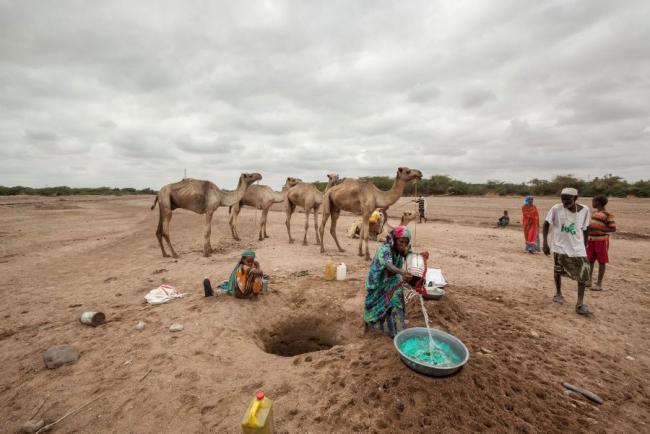
UN agencies step up joint response to help drought-affected northern Somalia
The two agencies are providing an integrated package of life-saving humanitarian assistance to halt the deteriorating food security and rising malnutrition in the affected areas of Somaliland and Puntland, where 385,000 need immediate assistance, while another 1.3 million are on the brink of slipping into a deeper crisis if rains continue to fail and aid is too slow to come.
The aid package includes food assistance, nutrition programmes, and health services, as well as support to help communities access safe water and improve sanitation and hygiene conditions.
“The communities have lived through four successive poor rainy seasons, and their ability to cope with the drought has been stretched to the limit,” said UNICEF Representative for Somalia, Steven Lauwerier. “Our concerted efforts are needed now to save the lives of tens of thousands of children and their families. Any delay from the international community will put their lives further at risk of hunger and disease,” he added
In addition to increased malnutrition cases and enrolment in nutrition programmes in the most affected areas, malnutrition-related deaths have been reported in areas such as Awdal region bordering Ethiopia.
In response, UNICEF is strengthening services at community level, deploying joint mobile health and nutrition teams to reach pastoral and other hard-to-reach groups. Malnourished children will receive an essential package of primary health care interventions, including emergency immunization. UNICEF is also providing 50,000 households with access to safe water via vouchers in the affected areas, and have repaired seven boreholes.
For its part, WFP has provided food assistance and nutrition support for 147,000 vulnerable people in the areas worst affected by the drought, and WFP continues to provide food or cash-based assistance to help families make it through the dry season.
“The people of Somalia know all too well the dangers of drought, but a drought does not have to mean a disaster – the world must recognize that we can save lives if we act in time,” said WFP Country Director Laurent Bukera. “It is absolutely critical that we are able to sustain assistance to the people affected by this crisis, so we can stem the damage of undernutrition for mothers and children before it has lifelong consequences.”
Together, the two agencies provide specialized nutrition support to prevent and treat malnutrition in pregnant women, breastfeeding mothers and young children.
Emergency health supplies have also been pre-positioned in regional hospitals, health facilities and with partners to support the response.
In Puntland, UNICEF pre-positioned nutrition supplies, including 500 cartons of BP-5 – a high energy biscuit. In Somaliland, 15,000 cartons of ready-to-use therapeutic food (RUTF) were provided to the Ministry of Health.
Keep children in schools
With thousands of children at risk of dropping out of school due to the drought, the two agencies are also working together to keep children and teachers in schools, and prevent exposure of children to the risks of family separation, early marriage, child labour and abuse. This is particularly pertinent as families continue to be forced into migration, in search of food, aid, and pasture for their livestock.
The UN has appealed for $105 million to provide humanitarian and livelihood assistance to some 1.7 million people, most of them pastoralists and agro-pastoralists who make up three quarters of the population in Somaliland and Puntland.
Photo:WFP/Petterik Wiggers
Support Our Journalism
We cannot do without you.. your contribution supports unbiased journalism
IBNS is not driven by any ism- not wokeism, not racism, not skewed secularism, not hyper right-wing or left liberal ideals, nor by any hardline religious beliefs or hyper nationalism. We want to serve you good old objective news, as they are. We do not judge or preach. We let people decide for themselves. We only try to present factual and well-sourced news.







